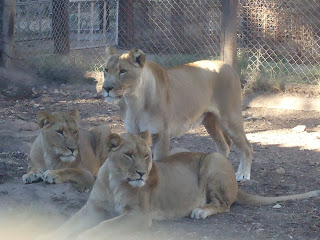Nicky Wilson picked me up two hours late because of a late start and trouble finding the house. We stopped at the Indian vegetable store before heading out to Chipangali, the wildlife orphanage that sits on about 200 acres 20 km outside of Bulawayo. I got a tour of the facility and met Nicole, the volunteer coordinator, and the other volunteers: Mikhail from Norway, Chris and Xander from Holland, Armaug from Israel, and Jackie from Australia. They are all 18-24 except for Jackie, who is a 42 year old nurse who alternates working and volunteering in Asia and Africa.
 |
| Nicole and Nicky |
 |
| Jackie the volunteer |
 |
| Jackie the jackal |
Our accomodations are in "the Camp," which has 6 cabins, a kitchen and dining area, a toilet and shower block, and a lawn area with a barbeque, swimming pool, and a firepit 6 feet in diameter. They are in the process of rebuilding the cabins, and the new ones are brick on a concrete slab with thatched roofs and ensuite bathrooms. Currently they have only one done and one in process, but they are supposed to be finished by December (TIA?). I have no windows in my cabin, but the metal roof is supported by logs and is open on both sides between the walls and roof. I do get spiders and rats at night, so I got a mosquito net so I can feel more secure when I sleep. I haven't heard any rats since I got rid of the
food I had with me.
 |
| My room at Chipangali |
 |
| Volunteer cabins |
 |
| Peacocks roam the grounds |
We have breakfast in the Camp kitchen, mainly toast and coffee or tea, but there is a refrigerator with eggs and syrup, so I did get ambitious and made French toast on the hot plate on my day off. We work six days a week and have to be at roll call at 7:45 a.m., so toast is enough effort most days. I am usually the first one up and heat the hot water. There are always a lot of bugs (mostly ants) I have to clean out of the pot first since they are attracted to the water left in there overnight
At roll call, the African workers get their assignments for the day first, then Nicole decides what to do with the volunteers. This is Jackie's second time here and she has been here a few months, so she is in charge of feeding and cleaning the cages of the carnivores (lions, cheetahs, hyenas, leopards, jackals, mongoose). She usually takes one volunteer to help, plus they have an African worker. The rest of us usually start by cutting large, leafy branches from various areas on the property with machetes and dragging them to the antelopes and goats for feeding. They have to eat 20% of their body weight each day. Then we do whatever needs done, like cleaning cages or just playing with the animals, especially the ones who are in cages by themselves. A lot of the animals are orphans or injured in some way, like being bit by a lion or hit by a car. We have birds with only one wing and a blind monkey. There is also a warthog, cows, sheep, and goats.
 |
| Workers wait for assignments at roll call |
 |
| Cutting branches for animal food |
It is expensive to keep 25 lions and 3 leopards in meat. A lot of the "food" is donated by local farmers when animals die. In the first week I was here, they got calls to pick up two donkeys, five cows, a horse, and numerous chickens. They have a large refrigerator to store the meat. I try to avoid the area where they cut the things up, since dead animals can be quite odiferous and attract a lot of flies.
The orphanage was founded by Vivian Wilson, a former park ranger and head of the Natural History Museum in Bulawayo, in 1973. He has published several books, and I am reading Orphans of the Wild, which was made into a TV series in the 1970's. He is 80 years old now and lives in town. His son, Kevin, and wife Nicky, and their children Michaela and Ryan now live in the house here and manage the property. We go to the house to eat lunch and dinner on their patio. It is usually prepared by their maid, Patricia.
Vivian (called VJ) has been sick and in the hospital lately. Someone called the SPCA and said his animals had no water. He has several house staff who take care of his animals, but we feared they had been slacking off since he wasn't around. Nicole took the volunteers to his house to clean up his bird pond and huge aviary before the SPCA inspectors came the next day. We did not have to deal with the snakes.
At Chipangali, we have several monkey cages, aviaries, turtle and crocodile environments, and a snake house. There is a black mamba that is about six feet long. These are the most dangerous snakes in Africa, since they do not run away, but are more likely to chase you. Their venom is both neurotoxic and cytotoxic, so it affects the nervous system and body tissue. There are also pythons, puff adders, and a cobra.
 |
| One of the aviaries |
 |
| Tammy the kudu |
 |
| Black mamba snake |
 |
| Crocodile |
A highlight of the week was the soccer match of the Chipangali team versus a team from a Bulawayo church. We lost, but had a great time.
 |
| The Chipangali soccer team |



















No comments:
Post a Comment